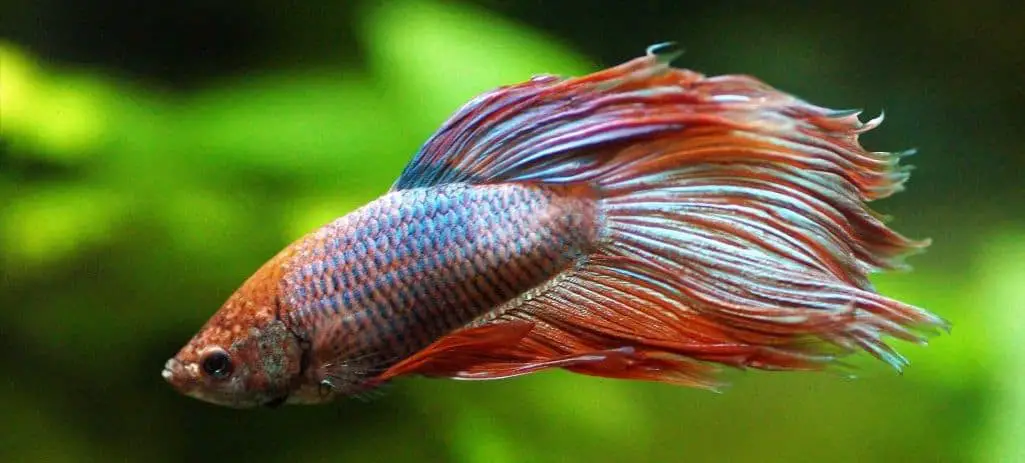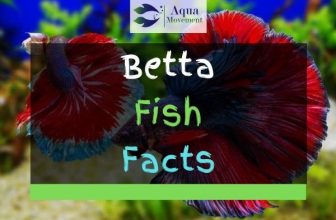Betta Fish Food And Feeding Guide
Betta fish are some of the most sought-after aquarium fish in the world. However, if you’re going to invest in one of these gorgeous creatures, it’s important that you know how to take care of them properly.
This covers all aspects of their health and lifestyle. For example, you should be aware what kind of fish are suitable as tankmates, what water conditions your betta needs, and what abnormal behaviors look like.
Possibly more important than all of these is the diet of your betta. Ultimately, your betta’s diet will be the deciding factor when it comes to their long-term health and general well-being.
That is why it is so important to do thorough research before you acquire your betta. There is a lot to learn, especially if you are an inexperience fish owner.
With the right food, and ambient water conditions, your betta can live a long and healthy life, bringing much joy to you as an owner. However, a poor diet can lead to a painful and slow decline in your fish’s health.
In this comprehensive feeding guide, we will discuss what do betta fish eat, and how often do you feed a betta fish. Armed with this knowledge, you can be a responsible fish owner.
Table of Contents
The Betta Fish
Video: “Don’t Buy A Betta Fish Without Watching This First. 10 Things You Should Know About Betta Fish.”
Before you can decide on the best feeding regime for your betta, you should understand a bit about the background of this much-admired fish species. The common name for the betta fish is the Siamese fighting fish, and this is definitely an apt title.
The betta is notoriously territorial, and it will not take kindly to any strangers invading its space. In fact, it will not hesitate to lash out at any fish that it considers to be a threat. This is why male bettas can never be kept together in the same tank, and it is also why you need to be very careful when selecting a tank mate for your betta.
It is best to choose a very small, peaceable fish that can stay out of the way of the dominant betta and avoid attention.
Betta Fish Origin
Bettas come from the freshwater streams, shallows and flood plains of South-East Asia. In fact, they are native to a number of countries such as Vietnam, Laos and Cambodia. They are also revered in Thailand where they are seen as a national symbol and a source of pride.
They like neutral water conditions and prefer warmer waters, but they are a relatively resilient little fish who can live comfortably in a variety of different conditions.
Bettas are available in a wide variety of vivid colors. They have been selectively bred for generations so that their natural hues and shades are enhanced. Today, you can find them in various vivid shades of orange, red and even blue.
They are a very aesthetic fish, and this, combined with their fearsome reputation, has helped increase their popularity. Like their colors, their temperament has also been honed by generations of selective breeding. In the wild they are not nearly so aggressive, as they naturally dwell in very congested waters in their homeland, waters brimming with life.
What Do Betta Fish Eat In The Wild?

Often, one of the best ways to select a diet for an aquarium fish is to examine what they eat in the wild. This can give you pointers, and make sure that you select food that is compatible with their system and gives them the required nutritional value.
In general, betta fish are not picky eaters, even though potential food is in abundance in their native waters. Betta fish are considered omnivores, which means they eat a mixture of plants and animals. However, they are more carnivorous than herbivorous, which means they have a preference for living prey.
In the wild, the primary constituents of their diet are zooplankton, small crustaceans and mosquito larvae. Although this might not sound super appetizing to you or me, this is still among their favorite food, even in captivity.
There is a wide variety of commercially available brands that seek to replicate the benefits of this diet, though some are more successful than others. They will also eat other types of water insects if they can find them. Basically, they are limited by their size, because a fully-grown adult betta is usually less than 7 cm in size.
How Often Do You Feed A Betta Fish?
How long is a piece of string may be the facetious answer to this question. Many people recommend feeding your fish three or four times a day, but in most cases, this is not fully necessary. With bettas, it is sufficient to feed them twice a day.
Of course, you can adjust the times slightly to suit your schedule best, but it is recommended to feed them once in the morning and once in the evening. The two feeding times should be roughly spaced 12 hours apart. This will give your fish time to fully digest the previous meal before tackling the next one. A regular feeding routine will also help you to remember.
It is not a total catastrophe if you forget to feed them every now and again. Just give them a bit extra the next time. They are very unlikely to die of starvation! Some owners have also noted that there is advantages to fasting their bettas once a fortnight. It has been observed that this can lessen the frequency and severity of health problems such as constipation.
If you are really worried about the feeding habits of your betta, then you can consult an expert. In most cases, there will be instructions along with the fish food indicating the frequency and amount that you should feed your betta.
Be aware that if you have other creatures in the same tank as your betta, they will need to feed as well. Given the aggressive streak in your betta, this can pose a real problem. There are solutions such as sinking food or feeding rings that can help make sure that aquatic creatures lower in the pecking order also get fed.
How Much Should You Feed Your Betta?
This is equally as important as the question, ‘how often do you feed a betta fish?’. This is also a place where many inexperienced fish owners make a mistake. The most common problem is overfeeding. Your betta fish do not need a whole lot of food to get by.
In fact, a good fact to remember is that their stomach is roughly the same size as their eye. This should give you a good indication of how much food they need. You also need to remember that many types of fish food expand greatly when they are immersed in water.
With this in mind, the following rule of thumb can be applied to feeding your betta. You should feed your betta no more than it can consume in about 3 minutes. Your betta will continue to stay eating so long as you provide it with food. This is a left-over evolutionary trait, because in the wild food can sometimes be scare.
Overfeeding
However, overfeeding can cause serious long-term health problems.
For example, constipation can be a real problem with betta fish. Bloating is another issue, as is obesity. In the small confines of your aquarium, the mobility of your betta is probably restricted, so it doesn’t have the chance to use up all the calories it consumes by eating.
Swim bladder can also be induced by overeating. This is a disease which affects the buoyancy of your fish and can cause it to comically flip over in the water.
Overfeeding can cause great damage to the wider environment as well, especially if you don’t clean out any excess food from the tank. Excess foods release nutrients into the water, which can seriously disrupt the balance of the artificial ecosystem.
This means the ‘good’ bacteria in your tank might not be able to cope, and this could lead to an algae bloom in the worst-case scenario. Make sure that you clean out any uneaten food from your betta tank after every short feeding session.
What Do Betta Fish Eat?
Video: “What Is the Best Food for Betta Fish?”
There are a number of different feeding regimes that could suit your betta fish. All of these different types of diets have their own advantages and disadvantages, and we will discuss each of them in turn.
You should make sure that you choose a diet that meets all the basic nutritional requirements of your fish, but also suits you in turns of convenience and cost. Taking all these factors into account is the only way to make an informed decision.
The most important thing to remember about the feeding habits of bettas is that they are basically carnivores. This means they have a naturally high demand for protein. You should choose food which contains a high percentage of crude protein, because this will give your betta the energy it requires to go about its daily life.
It is even more important to feed your fish a high energy diet during intense periods such as mating season or when they are young and still growing. As well as protein, betta fish have a number of other nutritional requirements.
For example, they should get an adequate supply of vitamins and minerals. This will usually be indicated on the packaging of the fish food you purchase. B and D vitamins are particularly important because they can help build up your betta’s immune system, meaning they are less likely to fall sick in the future.
Food To Avoid For Betta Fish
You should avoid purchasing fish food that is intended for goldfish or other tropical fish. This is unlikely to contain enough crude protein or some of the other energy intensive ingredients that bettas so badly need.
In fact, many of the cheaper fish food brands are packed with carbohydrate filler, which adds little nutritional value and can cause health problems such as constipation and bloating in your betta fish. In fact, these filler ingredients, such as corn, are very unsuitable for betta fish, because bettas have short digestive tracts and are unable to process these products.
In the end this just creates excess waste in your tank, which can have detrimental long-term impacts on the aquarium environment.
Best Betta Fish Food – Healthy + Colorful Betta
Pellet Fish Food
When most people are asked, ‘what do betta fish eat?’, this is their go to answer. Pellet food is among the most widespread fish food, for all types of aquarium species, including bettas. This doesn’t mean that it is the best for their constitution and health, but it does have its benefits.
For example, it is very convenient for the owner and is widely available. There is also a lot of choice among competing brands, and it is considered quite affordable.
[amazon box=”B0002ARY6Q”]
When choosing the correct pellet fish food, there are a few things to consider. Get a brand with a high percentage of crude protein, usually 35% or higher is required. You should also avoid products that use large amounts of filler to bulk up their pellets, and artificial hormones should also be avoided.
On the other hand, you may want to look out for pellets that contain special color enhancing additives, to help bring out the natural, vivid colors in your beloved betta.
Remember that pellets will usually expand when wet, so choose small pellets and feed them in small amounts. You should pre-soak the pellets to hydrate them. This will make them easier to process and digest for the betta fish, who are not used to dry foods. The optimum pellet size for a betta fish is about 1 mm.
Freeze-Dried Food
Video: “How To Prepare Frozen Food For Your Fish “
Freeze dried food is another candidate for what do betta fish eat. It is as convenient as pellet and flake food, but it has some inherent advantages. The freeze-drying system involves a minimum of processing or handling.
[amazon box=”B0002563LS”]
The freeze-dried stock (usually blood worms or shrimp) is caught and frozen to strip it of its moisture to ensure it doesn’t go off. This locks in a lot of the flavor and beneficial nutrients that the food possesses in the wild.
This is sure to attract your betta. They will go mad for the taste.
However, freeze dried food is best used in moderation, as part of a balanced diet including another staple. Too much dependence on freeze dried food can lead to long-term health challenges. Like pellet foods, it is recommended that you pre-soak freeze dried food in water before giving them to your betta, to rehydrate the food.
Live Food
Video: “4 Types of Live Foods for My Betta & How I Feed all of them”
This is the category that possesses the most natural goodness and purity; however, it also brings its own set of unique problems. Feeding your fish live food is the best way to replicate their natural environment, bringing out their natural predatory instincts.
This can be wonderful to watch, and can also help decrease their stress levels, as they feel more comfortable and at home.
There are a number of different live foods that your betta fish will happily devour. In the wild waters of South East Asia, they are known to prey on tiny mosquito larvae. However, you can also feed them bloodworms, daphnia, brine shrimp or mysis shrimp.
They will soon learn how to feed on these novel creatures. If you want to be a bit more adventurous, you can even breed your own fruit flies, which betta fish will also eat.
[amazon box=”B07Z43HYB8″]
The source of your live food is extremely important. Although this type of feeding brings a lot of benefits, it also carries a lot of risk. Introducing live food to your tank can also bring outside diseases and parasites into your tank. This can quickly turn your tropical oasis into a hellish quagmire.
What’s more, in such a confined space it is likely that any other tank mates will become infected too.
You need to get your live food from a very trusted source, where they have screening procedures to make sure the food is not infected. If possible, it is better to source your food locally or even breed the prey yourself, in a separate tank. This reduces the risk of infection.
Conclusion
The two questions, ‘what do betta fish eat’ and ‘how often do you feed a betta fish’ sum up a lot of the worries and queries that new fish owners have. In this article, we have tackled all aspects of this topic.
The answer to the question ‘how often do you feed a betta fish’ is twice a day, usually. There are exceptions and it is considered good practice to have fast days every now and again. The most common issue among inexperienced owners is overfeeding their betta. This can cause immediate problems such as constipation or bloating, but it can also lead to longer term health problems.
The answer to the question, ‘what do betta fish eat’ is a bit more nuanced. We have outlined a few different dietary options, each of which has its own perks and drawbacks. You may want to combine a few of these diet regimes, or even mix it up and occasionally give your betta some treats.
Whatever you do, make sure your betta gets sufficient amounts of protein, vitamins and minerals.
What Is The Best Betta Fish Tank Size?
How To Clean A Betta Fish Tank – 12 Step Guide




